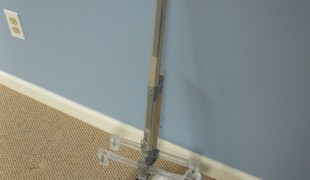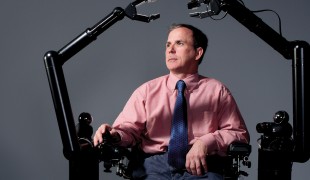- 5953
- 472
- 9
- 9
- 0
- Help Ukraine
About the solution
The students, from the Étienne Oehmichen High School, located in Châlons-en-Champagne, created an adaptable handlebar to help people who can only use one arm or hand. The gadget can be attached to all types of bicycles and comes off easily. It can be used by people who are right-handed and left-handed.
“The idea came from a friend who once saw a man with an amputated hand riding a bike. We said to ourselves, hey, why not make a handlebar so that people like him can ride a bike more easily?”, one of the inventors, Clément, said.
The team had the help of health professionals, such as a physical therapist, an occupational therapist, and the French Association for the Paralysed to develop the product.
Once they had a functional prototype, they tested it with the help of patients at the Fagnières Institute for Mobility Education. “A little girl who hadn’t ridden a bike in several months was able to do so again using our invention. That was very moving for us, and she was very happy. We are very proud,” Clément recalled.
This invention allowed the team’s mini-enterprise, Bike 4ll, to receive the Innovation Prize at the Regional Championship of Mini-Enterprises, as well as the Mobility Prize at the National Championship.
Adapted from: https://bit.ly/2PuKAW1
More info: https://bike4ll.jimdo.com/
This solution shall not include mention to the use of drugs, chemicals or biologicals (including food); invasive devices; offensive, commercial or inherently dangerous content. This solution was not medically validated. Proceed with caution! If you have any doubts, please consult with a health professional.
DISCLAIMER: This story was written by someone who is not the author of the solution, therefore please be advised that, although it was written with the utmost respect for the innovation and the innovator, there can be some incorrect statements. If you find any errors please contact the patient Innovation team via info@patient-innovation.com
-
-
567
-
0
-
9231

Man creates device to help to put on socks, shoes and even trousers
Grip
(SELF)-CARE: DRESSING: Dressing independently.
BODY BALANCE: Maintaining body balance
STANDING UP: Standing up from a seated position
Knee Deformity
Assistive Daily Life Device (to help ADL)
Strategy/Tip
Muscle weakness
Limited range of motion
Muscle pain or stiffness
Reduced grip force (grip)
Loss of muscle coordination
Muscle cramps or spasms
Joint deformity
Joint redness or warmth
Swelling or inflammation
Difficulty bearing weight
Muscle twitching
Difficulty standing from a seated position
Difficulty getting up from the floor
Numbness or tingling in the extremities
Joint pain or swelling
Restoring mobility
Promoting self-management
Preserving Organ Function
Rehabilitating After Stroke
Managing Neurological Disorders
Recovering from Traumatic Injuries
Maintaining Balance and Mobility
Preventing (Vaccination, Protection, Falls, Research/Mapping)
Caregiving Support
Internal Medicine
Neurology
Orthopedics
Physical Medicine and Rehabilitation
Rheumatology
Sports Medicine
Vascular Surgery
United States
-
-
-
422
-
0
-
5209

Tetraplegic invents mobility device to help him stand up
MOVING IN A WHEELCHAIR: Moving using a wheelchair.
WALKING WITH A WALKING AID: Walking with a walking aid
BODY BALANCE: Maintaining body balance
Spinal Cord and Nerve Root Disorders
Paralysis
Cerebral Palsy
Neuromuscular Disorders
Cervical spinal cord injury/Tetraplegia
Assistive Daily Life Device (to help ADL)
Walking Aid (wheelchair/walker/crutches)
Assistive Technology access
Muscle cramps or spasms
Difficulty coordinating movements
Stiffness or rigidity (difficulty moving)
Paralysis of the legs and lower body
Muscle weakness
Restoring mobility
Managing Neurological Disorders
Enhancing Mental Health
Maintaining Balance and Mobility
Preventing (Vaccination, Protection, Falls, Research/Mapping)
General and Family Medicine
Neurology
Orthopedics
Israel
-
-
-
477
-
0
-
7601

Paralyzed man designs innovative wheelchairs
CAREGIVING
MOVING IN A WHEELCHAIR: Moving using a wheelchair.
Grip
Rubgy
Basketball
Paralysis
Cervical spinal cord injury/Tetraplegia
Assistive Daily Life Device (to help ADL)
Assistive Technology access
Walking Aid (wheelchair/walker/crutches)
Restoring mobility
Replacing lost limbs
Promoting self-management
Promoting inclusivity and social integration
Recovering from Traumatic Injuries
Preventing (Vaccination, Protection, Falls, Research/Mapping)
Caregiving Support
Neurology
Orthopedics
Physical Medicine and Rehabilitation
United States
-
 en
en